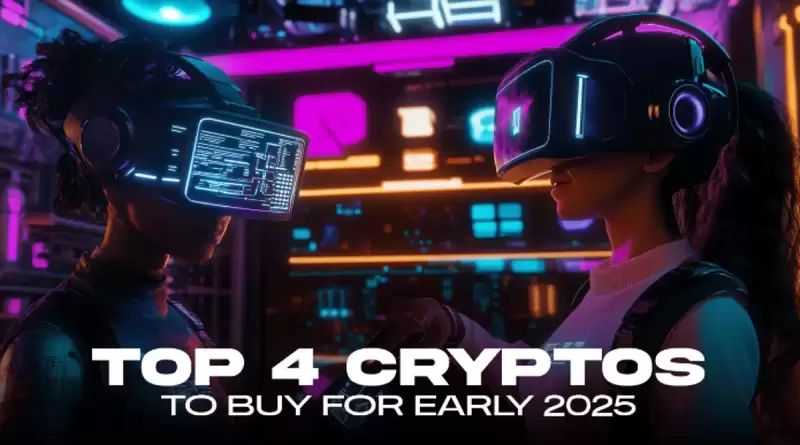 |
|
 |
|
 |
|
 |
|
 |
|
 |
|
 |
|
 |
|
 |
|
 |
|
 |
|
 |
|
 |
|
 |
|
 |
|
Cryptocurrency News Articles
Ethereum Layer 2 Scaling Solutions Projected to Reach $1 Trillion Market Cap by 2028
Apr 06, 2024 at 11:16 am
Ethereum's Layer 2 scaling solutions are projected to reach a $1 trillion market cap within six years, driven by their ability to address Ethereum's scalability limitations. These solutions promise significant revenue opportunities, with analysts forecasting a potential increase in the total market value of L2 tokens from $40 billion to $100 billion in the next 18 months. However, intense competition among numerous L2 projects raises concerns about the long-term value of L2-related tokens.

Ethereum's Layer 2 Scaling Solutions Poised for $1 Trillion Market Cap by 2028
Introduction
The limitations of the Ethereum blockchain in terms of transaction processing, data storage, and computation have been well-documented. Layer 2 (L2) scaling solutions have emerged as potential remedies to these constraints, offering enhanced transaction throughput and user experience. A recent analysis by Van Eck, a leading investment management firm, projects that Ethereum's L2 solutions could reach a market capitalization of $1 trillion within the next six years.
Addressing Ethereum's Scalability Challenges
Ethereum's scalability limitations stem from its inherent design, which prioritizes security and decentralization. However, this design choice has constrained the network's capacity to handle the increasing volume of transactions. L2 blockchains, which operate on top of the Ethereum base layer, provide a means to overcome these limitations without compromising the underlying principles of the network.
Optimistic Roll-Ups and Zero-Knowledge Roll-Ups
Van Eck's analysis highlights the critical role of Optimistic Roll-Ups (ORUs) and Zero-Knowledge Roll-Ups (ZKUs) in addressing Ethereum's scalability challenges. ORUs assume that transactions are valid until proven otherwise, while ZKUs employ cryptographic techniques to prove the validity of transactions without revealing underlying data. Both technologies significantly increase the blockchain's capacity to process transactions.
EIP-4844: Blob Space and Reduced Data Posting Costs
The upcoming EIP-4844 upgrade to the Ethereum protocol will introduce "Blob Space," a designated area for storing large data blobs. This upgrade is expected to dramatically reduce data posting costs, further benefiting L2 operations financially.
Intense Competition and Long-Term Token Value
Despite the positive market outlook for L2 solutions, Van Eck's analysts express caution regarding the long-term value of L2-related tokens. They anticipate intense competition among numerous projects, with a market likely dominated by a few general-purpose L2 networks and a plethora of use case-specific networks. This proliferation of networks may hinder the price appreciation potential of individual L2 tokens.
Growing Market Share and Total Value Locked
The report predicts that by 2030, L2 protocols will capture a significant portion of transaction value and Total Value Locked (TVL) within the Ethereum ecosystem. This growth is attributed to the potential for Maximal Extractable Value (MEV) to augment L2 revenues and the competitive advantages that L2 platforms may offer in specific market segments.
Shift Towards Zero-Knowledge Frameworks
The development of L2 solutions is undergoing a significant shift towards zero-knowledge frameworks (ZKUs). ZKUs offer improved efficiency, scalability, and privacy, making them an increasingly attractive choice for L2 developers.
Emergence of Use Case-Specific Roll-Ups
Beyond general-purpose L2s, Van Eck's analysis anticipates the emergence of numerous use-case-specific Layer-2 roll-ups. This expansion signals the potential for blockchain technology to permeate industries beyond finance, including gaming, social media, and infrastructure.
Conclusion
Ethereum's Layer 2 scaling solutions are poised to play a transformative role in the future of the Ethereum blockchain. By addressing the network's scalability constraints, L2s will enhance transaction throughput, improve user experience, and unlock substantial revenue potential. However, investors should be aware of the inherent competition in the L2 market and the challenges associated with predicting the long-term value of individual L2-related tokens.
Disclaimer:info@kdj.com
The information provided is not trading advice. kdj.com does not assume any responsibility for any investments made based on the information provided in this article. Cryptocurrencies are highly volatile and it is highly recommended that you invest with caution after thorough research!
If you believe that the content used on this website infringes your copyright, please contact us immediately (info@kdj.com) and we will delete it promptly.





























































